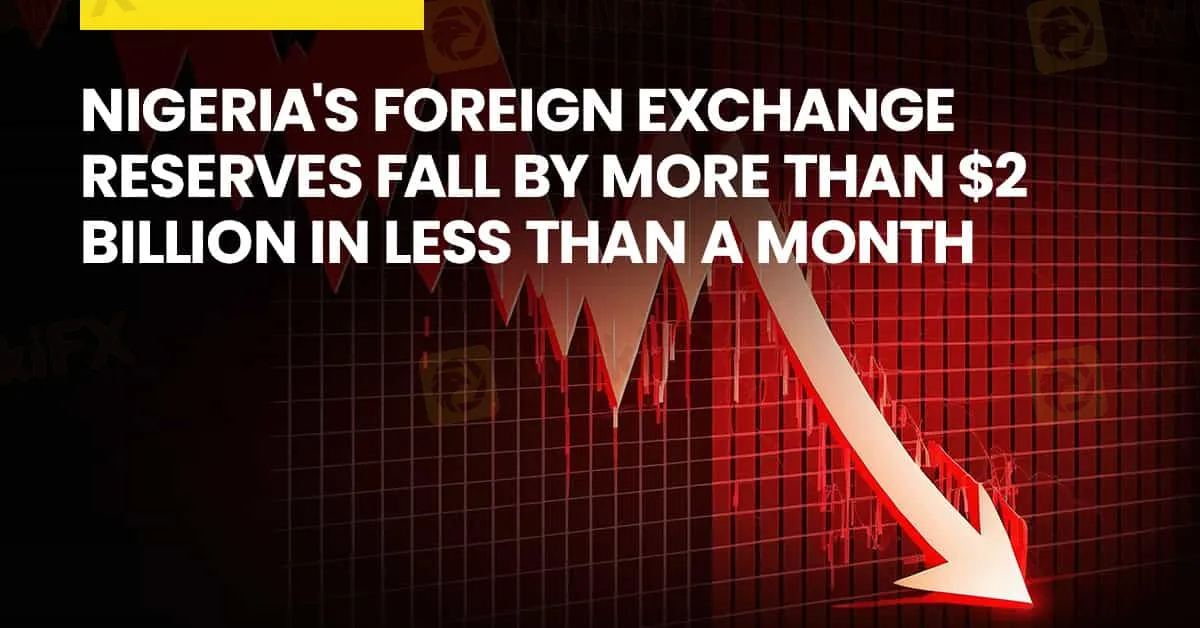Abstract:Nigeria's FX reserves have experienced a notable decline of almost $2.16 billion during a period of 29 days, despite the Central Bank of Nigeria's (CBN) vigorous attempts to stabilize the value of the naira. As of April 15, 2024, the CBN's current estimates show that the FX reserves are at $32.29 billion, from $34.45 billion on March 18, 2024.

Nigeria's FX reserves have experienced a notable decline of almost $2.16 billion during a period of 29 days, despite the Central Bank of Nigeria's (CBN) vigorous attempts to stabilize the value of the naira. As of April 15, 2024, the CBN's current estimates show that the FX reserves are at $32.29 billion, from $34.45 billion on March 18, 2024.
Previous reports indicated that the CBN's aggressive operations in the FX market to boost the naira resulted in a significant depletion of reserves, losing almost $1.02 billion.
This ongoing pattern emphasizes the ongoing challenges to Nigeria's currency and the proactive steps taken by the central bank to control market dynamics and support economic stability.
LEAST RESERVES IN MORE THAN HALF A DECADE
Nigeria's FX reserves have fallen to their lowest point since $32.28 billion on September 25, 2017.
The reserves experienced a 43-day increase, accruing $1.28 billion between February 5, and March 18, 2024, before finally reaching their lowest level in six years and six months. Prior to this, the CBN blamed the increase on rising remittance payments from Nigerians living overseas and growing interest in debt instruments, by international investors. The increase was attributed, among other things, to increased oil production and modifications made to the foreign exchange market, according to the apex bank, losing almost $2.16 billion between March 18, 2024, when they reached a high of $34.45 billion, and April 15, 2024, when they reached a critical low of $32.29 billion. The amount was $33.57 billion at the beginning of the month and decreased over time, hitting $33.43 billion by April 4. With the amounts at $33.04 billion on April 8, $32.61 billion on April 12, and $32.29 billion on April 15, the decline of reserves continued.
This declining trend highlights the ongoing financial hardship experienced by the central bank as it works to keep the value of the naira stable in the face of difficult economic circumstances.
PROBABLY CAUSES OF RESERVE DEPLETION
· Increasing FX Interventions by Central Banks: With the intention of stabilizing the naira, the CBN has stepped up a number of FX windows. This involves actively selling dollars, which lowers the total amount of reserves. Even while these interventions control the value of the currency, they quickly deplete reserves.
· Debt and Financial Obligations: Nigeria must pay off a sizable amount of its external debt, for Eurobonds and other foreign financial obligations. Foreign currency are needed to service these obligations, further depleting the reserves. Although updated statistics for Q1 2024 regarding Nigeria's external debt servicing is not yet available, between January and October 2023, half of its dollar payments for external debt servicing, highlighting the mounting impact of foreign debt on the country's economy. Additionally, Nigeria's January 2024 external debt servicing expenditures reached $560 million, a 339% increase over the $112 million spent the year before.
· Low Oil output and Revenue: Nigeria has been struggling with low oil output, which is mostly the result of vandalism, theft of oil, and infrastructure problems. Furthermore, the policies and circumstances affecting the world economy and oil prices have an impact. Nigeria has not been able to profit from the high global oil prices because of its decreased production capability. According to data from the Petroleum Exporting Countries' most recent monthly oil market report, Nigeria's crude oil production decreased for the second time this year, from 1.32 million barrels per day in February to 1.23 million barrels per day in March (OPEC). According to the latest figures, Libya produced somewhat more barrels per day (around 1.24% more) in March than Nigeria. Sen. Heineken Lokpobiri, the state minister in charge of petroleum resources, recently explained that problems with the Trans-Niger pipeline and some oil companies' maintenance efforts were to blame for the low output of crude oil in the first quarter of the year.
WHAT YOU MUST UNDERSTAND
· Significant drops in reserves have the potential to undermine investor confidence and result in a downgrading of the country's credit rating, which would raise borrowing costs. Nigeria's national bond credit rating is already considered inadequate, according to the World Bank.
· A further depreciation of the naira could result from the CBN's limited ability to act in the currency market as a result of the decline in reserves.
· According to a recent forecast by the International Monetary Fund (IMF), Nigeria's foreign reserves are predicted to significantly decline, reaching just $24 billion by 2024. These difficulties will be made worse by the lack of fresh Eurobond issuances, large repayments of current funds and Eurobonds totaling $3.5 billion, and ongoing portfolio outflows. On the other hand, given in portfolio inflows, it predicted a positive rebound to $38 billion by 2028.










